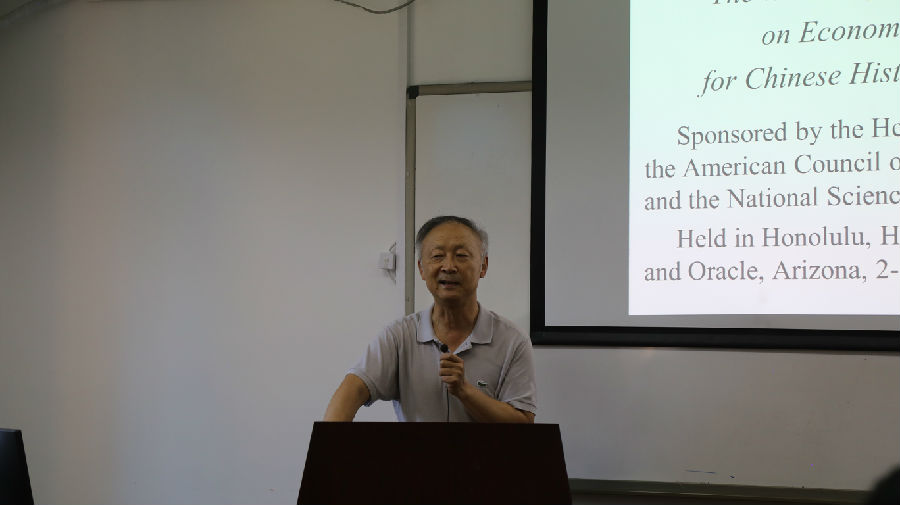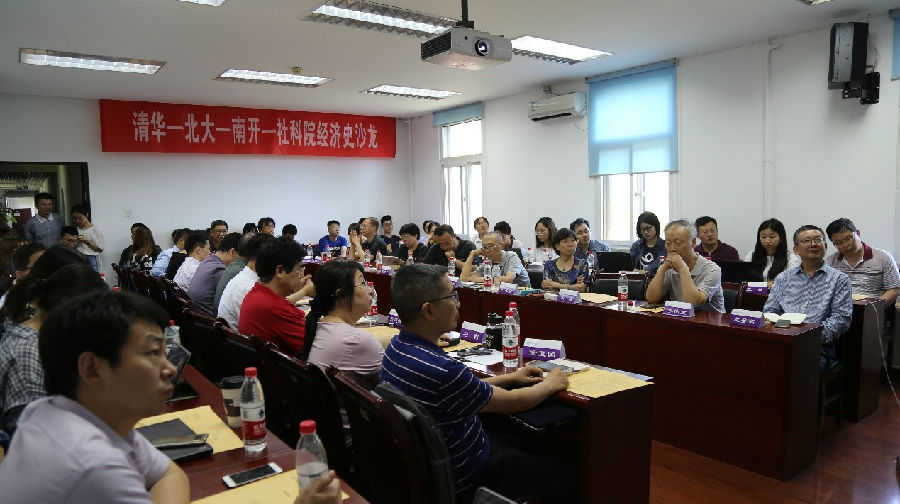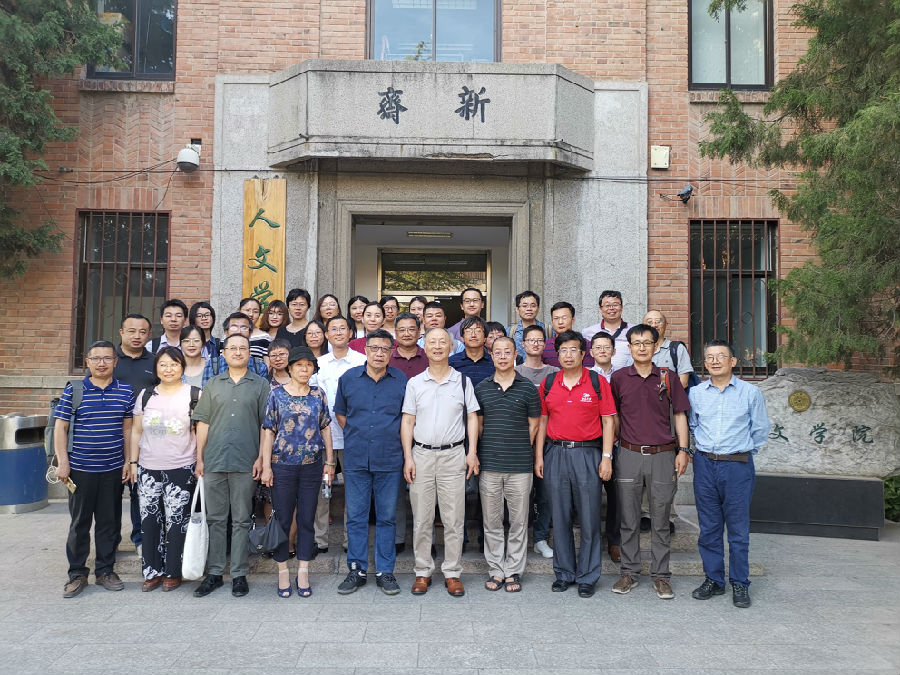On June 9, 2019, “Traditional Forms of Land Property Rights and Theoretical Revelations: TSU-PKU-NKU-CASS Economic History Salon” was held at Xinzhai 353, Tsinghua University. Present were over 40 scholars from four organizers and universities such as Sun Yat-sen University, Renmin University of China, Wuhan University, Beijing Technology and Business University and Nanjing Audit University.

Prof. Li Bozhong addresses the opening speech
Li Bozhong, Chair Professor of Humanities at Peking University, gave the opening address. According to the review by Prof. Li, the salon was launched in 2008 to facilitate interdisciplinary exchanges. Chinese scholars in economic history are expected to promote multi-multiple participation, deep exchanges and confrontation of ideas and views. The salon also aims at making an inventory of what we have achieved, or giving play to the role of economic history. Douglass C. North once said, “History is always important. It is not only because history gives us experience, but also because the present and the future are connected to the past through the continuity of the social institution. Choices made today and tomorrow are determined by the past.” Marx and Engels also said, “Productive forces are the product of man’s practice ability, but the ability itself depends on the conditions under which man live, on acquired productive forces and on the social form that already existed before them and created not by them。
but by their former generations.” Therefore, it is important to have a full understand of what we have accomplished. Today, we will discuss traditional forms of land property rights. The land property right system underlies the agricultural economic system, so this issue is a major subject facing not only historians, but also economists and political scientists.

Scene of the Salon
The first session was chaired by Prof. Zhou Jianbo, School of Economics, Peking University, and Xu Weiguo, Research Fellow, Institute of Economics, Chinese Academy of Social Sciences
The session began with a speech titled “Forms of Land Property Rights: an explanation based on China’s traditional land ownership” given by Prof. Long Denggao, Institute of Economics, Tsinghua University. Prof. Long argues that traditional forms of China’s land ownership are more adequate and diversified than contemporary ones, with room for theoretical extension. The following aspects can be taken into account: 1) with regard to forms of ownership, there are private and corporate property rights and state-owned land. Corporate property rights are often ignored and mostly seen in grassroots public goods and public services. 2) With regard to levels of land rights, there are ownership, the right of possession and the right of use, of which the right of possession represented by pawning right and permanent tenancy right has unique significance. 3) Land property rights can be traded by means of permanent selling, flexible selling, mortgage, pawn and tenancy, of which tenancy consists of foregift, permanent tenancy, fixed-rent tenancy and share tenancy, among others. The land property right system endows micro subjects with independence and autonomy and is replicable and reproducible, thus constantly enhancing essential characteristics of the traditional economy. This unique and content-rich land property right system becomes the cornerstone and pivot of China’s traditional economic society and the source of academic and theoretical innovations.
Later, Prof. Meng Chang, School of Economics, Beijing Technology and Business University, started with The Evolution of Traditional Institutions of Land Property Rights in China, a new book of Prof. Long Denggao, and discussed “the ‘spirit of contract’, as a rule of the evolution, in traditional transactions of China’s land property rights”. Prof. Meng mentioned that traditional China was a “contractual” society, but was there the “spirit of contract” in Chinese culture or among the Chinese or can the “contracts”, as rules, be self-enforced without the third power? A popular argument is that the Chinese have no or lack the spirit of contract. Based on an analysis of data on land property rights trading in the Chinese history and theoretical demonstration, Prof. Long Denggao et al. suggest that in traditional rural autonomous societies in China, not only had mature contract systems established and the endogeneity evolved, but contracts were enforceable and reliable; in other words, the Chinese had long had the “spirit” of contract, but such spirit was destructed in the rationalism-based social revolutions and reform movements. New results of the research on economic history are self-consistent from the perspective of both economic theories on creation and evolution of institutions (rules) and principles of the natural law. Finally, Prof. Meng raised a new question: can the spirit of contract in traditional China return? And can the spirit of contract among the traditional Chinese gain new vitality of market-oriented and internationalized economic development through “creative self-transformation”?
The second session was chaired and commented by Prof. Wang Yuru from Nankai Institute of Economics, and Hou Xudong, Director of Department of History, Tsinghua University. Diao Li, Associate Professor, Economics and Management School of Wuhan University, delivered a speech titled “Agricultural Collectivization in Poland during 1948-1956”. Through a case study of agricultural collectivization in Poland from 1948 to 1956, Prof. Diao summarized political and economic causes of such collectivization. She studied the implementation of agricultural collectivization in Poland based on the form and principle of and the progress in the collectivization, analyzed the failure of the agricultural collectivization in Poland and, on this basis, compared Chinese and Polish circumstances in this regard. She also probed into institutional legacies in the transition of agriculture after the disintegration of Eastern Europe. According to Diao, East European countries generally established people’s democratic regimes following the World War II, but rather than acting spontaneously, they were forced to do so and during 1944-1948, East Europe countries, including Poland, experienced a transitional period when they were “neither capitalist nor Soviet socialist”. Given a complicated political environment at home and for the purpose of maintaining national stability, Poland reformed its land system in 1944, which underlay its subsequent agricultural and land policies. Creating a good atmosphere for private agriculture in Polish agricultural policy was deemed as a distinctive “Polish approach” in the Soviet socialist system.
Li Yiwei, a doctoral student at Institute of Economics, Tsinghua University, introduced Forms of Land Possession in Concessions in Modern China, and presented the land deed model and land system represented by Shanghai title deeds, which, with the “permanent tenancy” at the core, originated from the Shanghai Land Regulation issued by the British Concession in Shanghai in 1845. How to implement the system varied from concession to concession, and a tenant leased land via the consul of a relevant concession or directly from the Chinese land owner or government, and the deed between the two parties should generally be approved by both the foreign consul and the Chinese government where the concession was. Under this system, with the development and expansion of concessions, the land market was decomposed into sublease, divided lease, added lease and other forms of secondary trading and the land deed trading market. Scholars are still divided on whether the property rights defined in a land deed are ownership or the right of use in nature. The speech gave explanations from the perspective of the right of possession and suggested that tenants acquired almost all land rights except title deeds and were protected by such deeds to develop the land, control returns on investment and have the right to mortgage. The core of this form of possession lay in the residual control right in the incomplete contract system, which stimulated, through future returns on investment, tenants to invest in the land, thus activating the land factor market and financial market in concessions and promoting the urbanization of modern concessions.
The third session was chaired and commented by Gao Chaoqun, Research Fellow at Chinese Academy of Social Sciences (CASS), and Zhang Yaguang, Deputy Dean of School of Economics, Peking University.
Prof. He Ping from Renmin University of China explained China’s traditional land property rights and contemporary land issues from a financial perspective. He stated that there were two financial functions supported by land property rights for farmers: firstly, improving agricultural technological and organizational models to raise agricultural output; secondly, human capital input for farmers’ engagement in non-agricultural industries. The “bundle of land property rights” mainly includes land ownership and rights to use, dispose of and benefit from land. Of these rights, land ownership and land use right (management right) are basic conditions to guarantee such financial functions. The financial attribute of traditional Chinese land was embodied in financing that aimed at improvement in land-based management technology and organization. In the traditional period when land was considered physical assets and served as the last line of defense against various management risks, the financial attribute of land showed up only when bid-ask spreads on land were used to complement normal operation, but not when landholders went bankruptcy.
Prof. Guan Yongqiang from Nankai University reviewed and sorted out the studies on allocation of land property rights in modern China in his speech. Allocation of land property rights in modern China has been concerned by the Chinese government and scholars at home and abroad as it has a significant theoretical research value and is closely tied to a number of practical problems. He probed into the characteristics of such studies in three stages, namely during the Republic of China period, in the 1950s-1980s and after the 1980s, and reviewed main investigations and findings by domestic and overseas scholars on this issue over the past century. Based on the social context of these studies and investigations, Prof. Guan investigated into characteristics of such allocation in that specific era; analyzed and remarked on these studies in terms of the reliability of relevant data and other respects; and on this basis, commented on the general condition of allocation of land property rights in modern China and made a new interpretation of the economic significance of the Agrarian Revolution from the perspective of economic order.
Prof. Wang Shuguang from Peking University addressed the speech titled “Historical Evolution and Future Trend of China’s Rural Land System”. Scholars have gained an understanding of reforms of the land system in China’s rural areas along two pathways, namely institutionalism and technologism, since modern times. The land system in New China underwent tortuous development of “decentralization-centralization-decentralization-centralization”, which took place under the basic background of industrialization and the catch-up strategy, created institutional conditions for the upgrading of the ability of New China to learn from other countries, agricultural modernization and a significant improvement of public goods supply in rural areas, and laid a solid foundation for industrialization in China. Since the reform and opening-up, the land system has been centralized, which conforms to the development trends of agriculture and rural areas on the premise of respecting farmers “contracts-property rights” and strikes a balance between “market-oriented development” and “people’s wellbeing”. At present, the land property right system, land trust system and rural collective economy are developing with innovative models emerging in an endless stream, effectively serving China’s goals such as agricultural security, rural revitalization and urbanization.
The fourth session was chaired and commented by Prof. Chen Zhengping from Tsinghua University, and Wang Xiaojia, Associate Research Fellow, CASS.
Assistant Professor Lin Zhan from Renmin University of China introduced the empirical study on how risk and transaction costs played a role in tenancy contracts in the Republic of China with Prof. Peng Kai from Henan University. Based on the survey data from South Manchuria Railways Co. (SMR) and on rural households in Manchukuo, they analyzed the impacts of risk and transaction costs on types of agricultural tenancy contracts and found that tenant farmers with less land property were more likely to enter into a share tenancy contract with land owners, which supported the risk sharing hypothesis; land owners who lived outside the countryside (or in cities) or lived in the countryside with the leased land located outside the countryside tended to choose fixed-rent tenancy, which supported the hypothesis of monitoring costs in transaction costs; land owners who provided large livestock were likely to sign a share tenancy contact, which conformed to the hypothesis of multiple tasks and moral hazards in transaction costs. This study can help better understand the characteristics of different tenancy contracts and help understand the process of combination of different production factors in the traditional agricultural society.
Wen Fangfang, a post-doctoral student from Tsinghua University, introduced deeds and contracts collected in Tsinghua University Library and her research findings. Special Collections Department of Tsinghua University Library has begun collection of folk historical documents since 2010, and has nearly 60,000 document collections. These collections mainly concern documents from Shanxi Province, and cover different historical periods such as the Ming Dynasty, the Qing Dynasty, the Republic of China and post-liberation, most of which are land deeds and contracts. These materials, mainly acquired from folk collectors, are distinctive in scale and data distribution of each batch. After placed into the Library, the materials should be sorted out and also repaired and preserved as they are valuable literatures and cultural relics. Wen Fangfang et al. have obtained research results based on these documents, especially from the economic analysis of traditional land contracts within the theoretical framework of contracts.
Prof. Zhong Weimin, Department of History, Tsinghua University, and Wang Zhenghua, a doctoral student, carried out the research on market operation of rural land based on deeds and contracts from Tsinghua Library. Based on deeds and contracts of the Ming and Qing Dynasties discovered in Xiangling County and Taiping County, the following characteristics of local land transactions in that period can be found: land transactions were greatly influenced by the environment, institutions and rituals. Land consisted of natural and institutional land by category, which mainly varied in irrigation water regulations, trading rituals and institutions. Moreover, factors such as the Lijia system, patriarchal clan construction, rural network and village space acted together on local land market, so that the land market could operate normally. Common land transactions were subject to multi-party negotiation and consultation, which involved connotations such as property sharing and family situation. The process of trading by means of tenancy, mortgage loans (borrowing, getting credit, incurring debts, impawning, etc.), assignment, pawning (sub-pawning), pledge, cashing, exchange, transfer, selling, permanent selling, bestowal and so forth witnessed a network of social relations, and the connection and co-occurrence of different means of trading in the same trading process could be ascribed to the extension and continuation of a debt relationship.

Group photo of participating guests
Finally, the free discussion was chaired by Prof. Liu Zhiwei from Sun Yat-sen University, and Lei Ming, Associate Professor, Nankai Institute of Economics, and addressed by Prof. Fan Shitao from Beijing Normal University, Peng Bo, Associate Research Fellow, Chinese Academy of International Trade and Economic Cooperation, Ministry of Commerce, and etc.
(Contributed by Li Yiwei and Ding Chunyan, Center for Chinese Entrepreneur Studies, Tsinghua University) ?